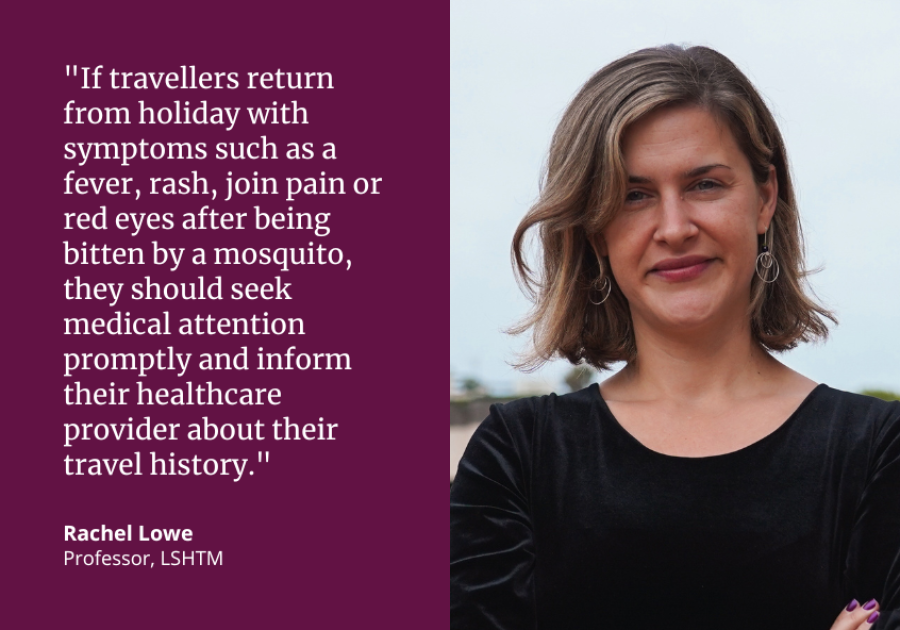Expert Comment – Dengue season in Europe
29 July 2024 London School of Hygiene & Tropical Medicine London School of Hygiene & Tropical Medicine https://lshtm.ac.uk/themes/custom/lshtm/images/lshtm-logo-black.png
"If travellers return from holiday with symptoms such as a fever, rash, join pain or red eyes after being bitten by a mosquito, they should seek medical attention promptly and inform their healthcare provider about their travel history." Rachel Lowe, Professor, LSHTM
The ‘tiger mosquito’, Aedes albopictus, is spreading further north, east and west in Europe, according to the European Centre for Disease Prevention and Control (ECDC).
Aedes albopictus carries a number of viruses that can infect humans, including dengue.
While most cases of dengue in Europe are 'imported’, brought in by travellers from dengue-affected regions, there has been a notable increase in locally-transmitted cases, which occur when mosquito colonies become established in European countries.
Concerns have been raised that large scale events, such as the Paris 2024 Olympics, may inadvertently lead to an increase in cases.
Since 2010, when the first outbreak was reported in Croatia, 48 outbreaks have occurred in Europe. A peak in 2023 included eight outbreaks in France, four in Italy and two in Spain.
A second mosquito species, Aedes aegypti, the main carrier of dengue in the Americas, has also become established in Cyprus.
Most people infected with the dengue virus will have no symptoms. Those that do will commonly experience high fever, severe headache, muscle and joint pain, and a rash, which typically subside in 1-2 weeks. There are currently no treatments for dengue infection.
Explaining why cases may be increasing and how we can reduce our risk, Professor Rachel Lowe, a Royal Society Dorothy Hodgkin Fellow at the London School of Hygiene & Tropical Medicine (LSHTM), said:
"There has been a considerable increase in the spread of Aedes albopictus across the globe and into Europe since the late 1990s, mainly through international trade and transportation of goods. Used tyres and bamboo plants, for example, can provide ideal breeding sites for mosquitoes.
"Increased international travel between Europe and areas of the globe where these diseases are endemic may also be playing a role. Climate change is leading to warmer temperatures for longer periods of the year, creating more favourable conditions for the mosquito’s survival and reproduction.
"The European Centre for Disease Prevention and Control coordinates surveillance efforts across Europe, providing risk assessments, guidelines, and support in managing mosquito-borne disease threats. Data from the UK is fed in from the UK Health Security Agency (UKHSA), which conducts active mosquito surveillance particularly at points of entry like ports and airports.
"In the case of outbreaks, rapid response teams will contain and manage cases by eliminating mosquito breeding sites in surrounding areas.
"To minimise their own risk of dengue infection, travellers should try to avoid mosquito bites by wearing long sleeves and trousers, using repellent and ensuring windows and doors have screens. It’s also important to check and eliminate standing water where mosquitoes can breed, such as in plant pots, buckets, and clogged gutters.
"If travellers return from holiday with symptoms such as a fever, rash, join pain or red eyes after being bitten by a mosquito, they should seek medical attention promptly and inform their healthcare provider about their travel history."
If you enjoyed this article and would like to build a career in global health, we offer a range of MSc programmes covering health and data, infectious and tropical diseases, population health, and public health and policy.
Available on campus or online, including flexible study that works around your work and home life, be part of a global community at the UK's no.1 public health university.